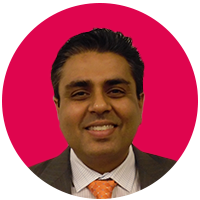INTERVIEW WITH ASHISH THAPAR, MD, MBA
What guided your decision to go into medicine and specifically, your chosen field?
Academically, in school I was a bit of an overachiever. Growing up in India, the pinnacle of academic achievement is to become a doctor. While I was gently nudged towards the medical profession by my parents and family friends who are physicians, what opened my eyes to the impact of medical science was when I started participating in community vaccination programs in my town organized by the local hospital. The polio eradication program showed me what medicine could achieve for humankind. After finishing medical school, I went on to pursue a residency in Ophthalmology at Christian Medical College and Hospital, which is a premier institute in healthcare and medical education in India. I became very involved with the community ophthalmology program which was sponsored in part by Christoffel Blindenmission – CBM, a not for profit international organization that helps people affected by disability by supporting local partner organizations to run programs in the fields of healthcare, rehabilitation, education and livelihood opportunities. Providing much needed eye health services to people in the remotest parts of the country and then spending several months as an eye physician in a Christian Mission Hospital profoundly shaped my understanding of my role as a physician and my future pursuits.
After moving to the USA, I decided to pursue family medicine, a field where my services and expertise would be most needed. Working as a family practitioner and weight loss specialist has helped me understand and treat patients with a comprehensive approach, including preventative health, population health, physical and mental health. I’m especially involved in managing metabolic conditions and obesity. Around 100 million adults in the United States are overweight or obese, a condition that substantially raises their risk of morbidity and death from hypertension, dyslipidemia, type 2 diabetes, coronary heart disease, stroke, gallbladder disease, osteoarthritis, sleep apnea and respiratory problems, and endometrial, breast, prostate, and colon cancers. My chosen field has helped me build relationships and trust with the patients and has helped me be a partner in their health journeys.
“A doctor should be an unapologetic steward of his/her patient’s health and well-being. Trust is a fundamental characteristic of the physician-patient relationship. Patients must trust that their physicians will work in their best interests to achieve optimal health outcomes.”
What are the most important qualities for a doctor to have?
Compassion (Empathy) and Competence. As a physician, you should have the ability to show sensitivity or to understand another person’s pain/problems, and the desire to go out of your way to help your patients. Competence helps you perform the job better and efficiently.
What guided your decision to go into the business side of medicine?
I have been working as a family medicine physician for 13 years, and while I love patient care which is tremendously rewarding, I soon realized that clinical medicine also has to be supported with sustainable business models. I also realized that while being central to the workings of the healthcare industry, physicians like me knew precious little about the complex business models of various participating entities-the pharmaceutical industry, health insurance organizations, hospital systems and others. My interest in learning about the business of medicine prompted me to start working with a managed care organization to understand the provider- payer- patient relationship better. As I have grown into leadership roles both in clinical medicine and health insurance organizations, I realized that to be more effective in my work, I needed to learn and imbibe the cardinal concepts of business management. Hence I decided to pursue the Business of Medicine Physician MBA Program at Indiana University Kelley School of Business. This educational excursion has allowed me to view the healthcare landscape from a vantage point, and has created a paradigm shift as to how I understand and approach healthcare organizations, and also shaped how I conduct myself in my professional and personal life.

What is the most important factor in the doctor/patient relationship and why?
A doctor should be an unapologetic steward of his/her patient’s health and well-being. Trust is a fundamental characteristic of the physician-patient relationship. Patients must trust that their physicians will work in their best interests to achieve optimal health outcomes. Effective, empathetic communication is key to building that trust. Collaborative decision making enables physicians and patients to work as partners in order to achieve a mutual health goal, and leads to greater patient satisfaction and loyalty.
What is your favorite activity outside of work?
Traveling, which has been severely restricted during the pandemic; and spending time with my daughters, who at 11 and 8 years of age, are smarter than their dad any given day. When I can, I love hiking. My last excursion in the Flatirons close to Boulder, Colorado was a fantastic experience. I’m a lifelong student, and read extensively about medicine, business–especially healthcare, human history and cultures.

You recently joined the Doctorpedia team as a Founding Medical Partner. What about Doctorpedia resonates with your personal and professional mission?
Doctorpedia’s mission of providing healthcare information from authentic resources, created and reviewed by physicians was certainly what attracted me to get behind and support this company. As this platform grows, physicians and healthcare entities will be able to present correct information and fight online misinformation. Doctorpedia collaborates with physicians, and healthcare providers to create a unique online resource of healthcare information, both for patients and healthcare organizations. Doctorpedia specializes in presenting high-quality medical content as well organized, short 1-2 minute videos which allows the consumer to easily access and understand important health information. These videos allow the physician, health care organizations, pharmaceutical companies, payer organizations and other healthcare entities to showcase their services while providing valuable scientifically vetted information to their consumers and stakeholders. I believe this business model is a winner- the subscription model, sponsorship of channels, advertisement and platform utilization will generate multiple revenue streams. There is immense potential for scalability and growth. Involving the physician community to participate and help create content is the key element that creates tremendous value for the company.
What problem do physicians face that Doctorpedia can help solve?
The Doctorpedia platform will help physicians quell misinformation that patients get from various sources, allow physicians to provide patient education in easy to understand engaging video format, physicians and healthcare organizations can showcase their practices and services, which in turn will improve patient recruitment and retention for subscribers.
“Doctorpedia’s mission of providing healthcare information from authentic resources, created and reviewed by physicians was certainly what attracted me to get behind and support this company. As this platform grows, physicians and healthcare entities will be able to present correct information and fight online misinformation.”
What problems do patients face that Doctorpedia can help solve?
We have a huge problem of online misinformation which is unchecked and patients need resources they can trust, Doctorpedia has the potential to become a trusted resource that will fill that void.
What do you think about the population health and wellness information and resources available online?
Population health management refers to the process of improving clinical health outcomes of a defined group of individuals through improved care coordination and patient engagement supported by appropriate financial and care models. Millions of people in the US have insurance but have inadequate access to care or do not utilize the benefits they have from their medical provider and health insurance provider. Also, with millions of baby boomers getting into the Medicare eligible age group, payer and provider organizations are scrambling to find ways to keep this population healthy so they do not become a huge financial burden raking up healthcare costs. With digitalization of healthcare and also innovative models of healthcare delivery developing in the last decade, organizations are now incorporating the systems to coordinate patient care and keep subsets of population healthy. While there is plenty of information available online, patients generally do not have a good grasp of what services different organizations are providing that would be useful to them. I believe a platform like Doctorpedia can help organizations showcase their services including services like providing transportation to and from healthcare providers, healthcare delivery models like telehealth and remote patient monitoring that improve access to care, programs to improve social determinants of health like food, shelter, living conditions, preventative care like vaccinations.
Similarly, there is a lot of information, and misinformation about obesity and metabolic health on the internet, from sometimes dubious sources pushing supplements, services, diets and videos to the consumer which can be very confusing and sometimes detrimental for the consumer. Doctorpedia will be a reliable evidence based resource to help consumer/patient understand metabolic health and wellness, and the benefits (or lack of) of various diets, supplements and programs, and make appropriate choices. Healthcare organizations have underutilized wellness programs. Both provider and payer organizations are also actively trying to improve the health of both their patients and employees with wellness programs and education, health coaching, nutrition etc., of which they can inform their consumers about using Doctorpedia.

What would you do for a living if you weren’t a doctor?
An anthropologist- I love learning about different cultures and history, and how that relates to human behavior in past and present societies. My travels always include a deeper dive into the cultures of the places I visit.
What were your previous roles in healthcare and what did you learn from them?
I served as Medical Director for American Health Network where I helped establish the Employer Health Clinic services in Indiana. I was involved in supervision of staff and operations at Employer Health Clinic, including advanced practice providers, helped develop a formulary for in house pharmacy, established operational protocols, and built a comprehensive wellness program including metabolic health and weight loss services. I’ve been working as a staff physician with the organization for the last 13 years as well, helping the organization transition from fee for service to value based care model. I am a supervising physician with Kroger- The Little Clinic, where I provide medical supervision of clinical providers including Nurse Practitioners and Physician Assistants, covering 8 offices in the Greater Indianapolis area, including appropriate documentation, billing and coding, and evidence based medical decision making.
Currently, I serve as Medical Director for Managed Health Services (Centene Corp.) in Indiana, where I am actively involved in planning and implementation of health care benefit and cost initiatives, lead integrated care teams, medical reviews, provider and payer quality improvement, and pharmaceutical and medical policy.
There’s a business concept in Lean Six Sigma that I learnt, and live by – Go to the Gemba. Gemba is a Japanese word, which means “the actual place”—the place where the work happens. The only way to learn what’s really happening on the front lines is to go to the gemba and see for yourself. In all my clinical and leadership roles, I try to understand the job requirement, operations, personnel, pain points, need for change, and come up with recommendations and a game plan for operationalizing the desired changes.
I have tried to understand my own motivations, strengths and weaknesses. I evaluate success based not only on my work but also on the work of my team, and my organization. I have learnt to be very accessible, and hopefully personable with the people I work with, lead, or report to, encouraging feedback among colleagues and keeping lines of communication open. That has helped me develop strong, mutually respectful relationships.

Ashish Thapar, MD
Family Physician and Obesity Medicine Physician
Dr. Thapar is a Healthcare Executive, Managed Care Medical Director, Family Physician and Obesity Medicine Physician with significant experience in Healthcare Delivery models, Healthcare Policy, Managed Care, Utilization Management, Healthcare Consulting, Digital Health, Strategic Planning, Clinical Supervision, Primary Care, Weight Loss Medicine and Healthcare Leadership. Dr. Thapar is a Doctorpedia Founding Medical Partner and Strategy and Managed Care Advisor on the Advisory Board.

